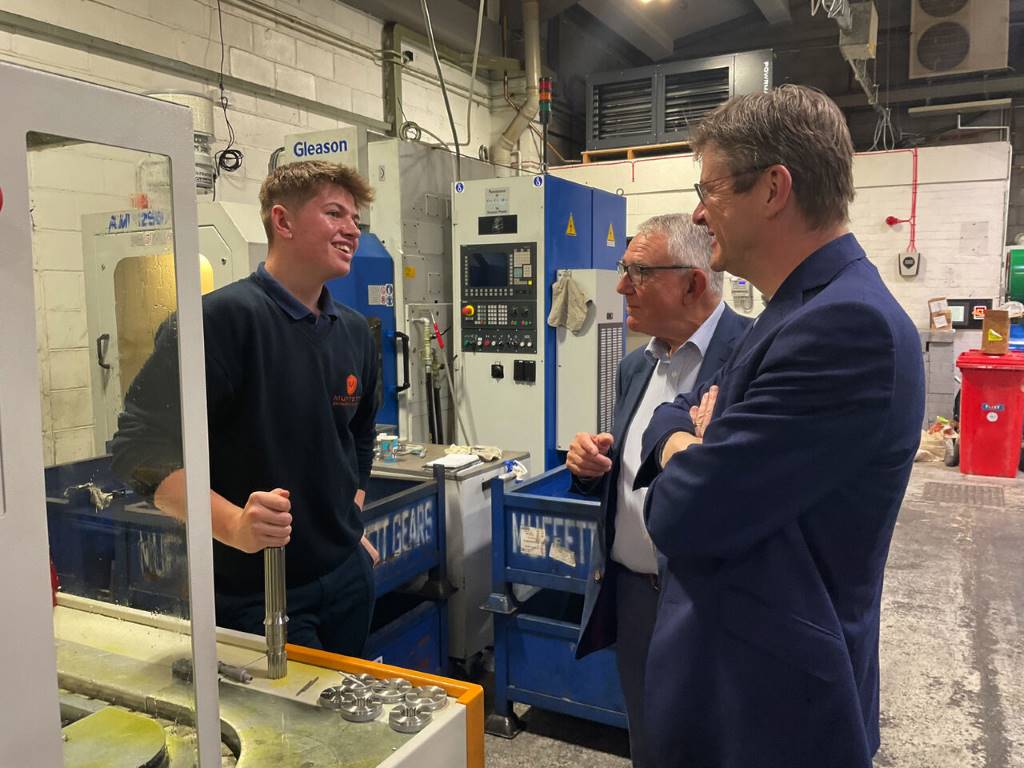Nadcap: The next step
The aerospace industry is seen as an attractive prospect for many companies working in similar fields, partly because it has not suffered as badly in the economic downturn as some other industries.
Any business looking at enhancing its presence in the sector will have undoubtedly encountered Nadcap – a global cooperative program designed to manage a cost-effective approach to special processes and products and provide continual improvement within the aerospace industry. Solutions reports.
Companies already operating successfully in the automotive, medical device and defence sectors are increasingly investigating opportunities to join the aerospace supply chain. Meanwhile, organisations that are already integrated into the aerospace industry are working to increase their competitiveness in the face of new entrants to the industry from all over the world. Many of these companies have gained AS9100 and some are involved in SC21.
Nadcap was formally known as NADCAP which stood for National Aerospace Defence Contractors Accreditation Program. As the program grew globally, this was changed and is now a brand name simply known as Nadcap.
Essentially it is an accreditation program for special process and product quality utilised by the majority of aerospace prime contractors around the world as part of their supply chain risk mitigation strategy and to fulfil the regulatory requirement for oversight. Aerospace industry leaders such as Airbus, BAE Systems, Rolls-Royce, Boeing, Bombardier and Lockheed Martin subscribe to the Nadcap program, which conducts over 4,000 audits around the world each year. The nature of the program means that consistently good audit performance is rewarded by extending the accreditation validity – thus, the number of accreditations annually exceeds the number of audits conducted.
There are currently 317 Nadcap accredited companies in the UK, holding 976 accreditations between them. Over 500 Nadcap audits take place in the UK each year (approximately 12.5% of all Nadcap audits conducted annually) and this number has more than doubled since 2003. The UK is consistently the second most common location for Nadcap audits, following the USA.
Benefits of Nadcap participation exist for all parties – for example, one Nadcap subscribing prime has reported annual savings of over $1 million and up to $5 million per year while achieving technically superior audits.
Positive impact
In June 2010, the Performance Review Institute (PRI) – a not for profit organisation set-up to advance the interests of companies through the development of performance standards and certification programs – released a 20th anniversary survey to determine the impact that Nadcap has had on aerospace suppliers. The 1,151 respondents indicated that 35% have reduced their scrap rates (36% in the UK); 41% reduced their rework rates (44% in the UK); and 44% reduced their escape rates (40% in the UK). The same survey also revealed that for 54% of the respondents (38% in the UK), their sales and/or ability to attract new business had increased. 19% of the UK respondents felt that productivity had increased and 56% of the UK respondents indicated that standardisation had improved.
| Rates | Decreased | No effect | Increased |
| Scrap | 35% | 64% | 1% |
| Rework | 41% | 56% | 3% |
| Escapes | 44% | 55% | 1% |
| Sales | 4% | 42% | 54% |
Seema Martin, PRI's director for Europe and marketing solutions explains: “It is no surprise that UK suppliers report better performance in terms of scrap and rework rates as the UK has a long and respected tradition of aerospace excellence. However, it is not sufficient to refer to the past in aerospace, which is a fast moving, cutting edge industry. It is vital that all companies work hard every day to remain competitive in an increasingly global market.”
 No easy ride
No easy ride
Nadcap is the tool that suppliers can demonstrate their commitment to excellence in special process/products and gain and retain customers. But the audit is not easy.
Lloyd Barker, director of corporate quality, Alcoa recommends: “Investing your time in thorough preparation for the Nadcap audit is the best advice I can give. Achieving Nadcap accreditation is not easy – and it is not intended to be. The audit is a detailed review of your company's compliance to customer requirements and industry specifications.”
The Nadcap process typically begins with a notification from a customer to the supplier that they should attain accreditation, although companies choose to pursue Nadcap accreditation without prompting.
The supplier (i) contacts PRI to request the audit (ii) which is scheduled according to the timeframe and content expectations of the supplier and the customer (iii). An appropriate auditor is assigned (iv). Nadcap auditors typically have over 30 years experience in their field and are contracted after a rigorous selection process into which the primes and suppliers input. After the audit, a report is submitted electronically via eAuditNet, the Nadcap audit software program (v). The supplier has an opportunity to respond to any non-conformances identified and the report and responses are reviewed by the relevant PRI staff engineer (vi).
When the staff engineer is satisfied that the root cause of all non-conformances has been identified and sustaining corrective action has been implemented, the entire report is submitted to the special process Task Group (vii). This body of Nadcap subscribing primes, who are also experts in the special process, verify the conclusion of the staff engineer and approve the audit for certification (viii). At any stage, the staff engineer or Task Group may request more information before progressing the audit to the next stage (vi) and (vii).
Prepare to be audited
There are many steps a supplier can take to prepare for the Nadcap audit or even just to determine whether the Nadcap route is suitable for their business. At the recent Aero Engineering UK event in Birmingham, a series of recommendations were presented to help suppliers successfully gain Nadcap accreditation. These include:
Learn more about Nadcap
• Visit the PRI website for more information about the Nadcap program
• Contact PRI scheduling staff to discuss to obtain a quote for your Nadcap audit
• Get to know the PRI staff engineers – they are a valuable technical resource
• Attend a training class on Nadcap Audit Preparation Specific classes are available for chemical processing, heat treating, non-destructive testing and welding and include a detailed review of the audit checklists. Learn more at www.eQuaLearn.com
Access eAuditNet
• Go to www.eAuditNet.com and register as a new user
• Access the Resources section to review the procedures governing the Nadcap program, the relevant audit checklists and other helpful special process specific information. The checklists on eAuditNet are the same documents that the Nadcap auditor will use during the site visit so a thorough review of these is essential to audit success
• Address any questions about eAuditNet to eAuditNetSupport@sae.org
Attend a Nadcap meeting
• Check the upcoming Nadcap meeting dates, agendas and past meeting minutes at www.pri-network.org: there are two meetings taking place in Europe in 2011. Barcelona, Spain is the destination for the first meeting (28th February - 4th March) and London, UK will host the second Nadcap meeting of 2011 (20th – 24th June).
• Participate in a meeting convenient for you: Nadcap meetings take place three times per year all over the world. The Nadcap meetings are a forum for Nadcap subscribing members and suppliers to discuss checklist revisions and continual improvement opportunities.
Verify your customers' intentions
PRI can help you to schedule a Nadcap audit but cannot input into the content of the audit. This depends on your customer requirements. Make sure you understand what does – and does not – need to be included in the Nadcap audit by contacting your customer for confirmation.
Schedule your Nadcap audit
Work with your internal scheduling department and PRI scheduling to arrange the Nadcap audit for a date when you will be processing parts for a Nadcap subscriber. If you do not currently process parts provided by a Nadcap subscriber, contact PRI to discuss how to proceed.
Implement an internal audit plan
Make the audit more manageable by creating a schedule to review one checklist at a time. As above, the checklists are available to download from eAuditNet.
It is recommended that, for each checklist question, you identify what you will show the Nadcap auditor to evidence your response. If you are unsure, assign a non-conformance to that question. Fix all non-conformances with Root Cause Corrective Action prior to the Nadcap audit, with enough time to verify that the corrective actions are sustaining.
To ensure you fully understand the expectations of Root Cause Corrective Action for Nadcap, participate in a training class – details are available at www.eQuaLearn.com. One attendee reports that: “because of our improved understanding of RCCA, the following month, when we had a Nadcap audit, we reduced our cycle time by one third and the days needed to respond by 15% compared to the previous audit.”
Ultimately, the end product is only as strong as the weakest link in the supply chain and any deficiencies can potentially impact the safety of the flying public. The aerospace prime contractors know this and are continually monitoring their existing and potential suppliers to identify the best. Nadcap is one of the tools used to do this.
PRI
www.pri-network.org
About PRI
Created in 1990, PRI is a not for profit organisation with a mission to provide a full range of programs and services designed to improve and add value to manufacturing process and product quality. Headquartered in Pittsburgh, Pennsylvania with a European office in London and offices in Beijing, China and Japan, PRI is led by a board of directors with responsibility for the organisation's strategic direction and financial stability. The board is comprised of leading quality executives of some of the world's largest aerospace companies.











